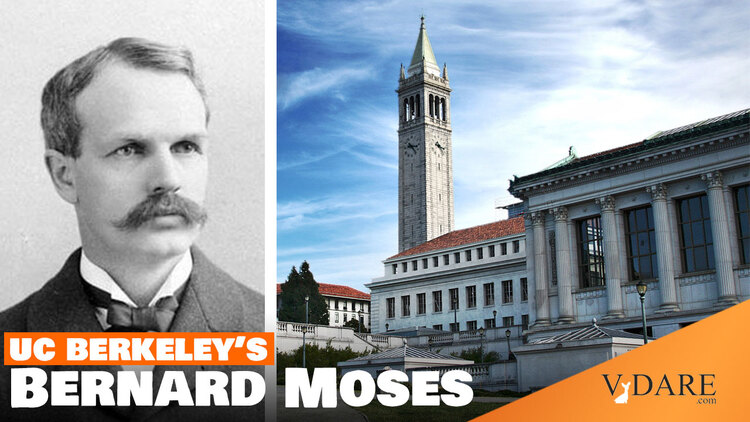


03/24/2023
Re: The Great Replacement Comes For Boalt Hall, Hastings School Of Law… And Anglo-America
From: A Berkeley Reader
It’s reported that UC Berkely is going to close three libraries — something a university actually needs — because of budget cuts.
How about cutting back on the number of salaried diversicrats in the administration? Those funds could more than cover any library costs on the campus.
By the way, it’s hard to keep up with the renaming mania at this university. As of 2021 four campus buildings (LeConte, Barrows, Kroeber, Boalt) had their names removed because the dead white males whom they once honored have been retroactively condemned for sinning against the cult of wokeness.
The University of California, Berkeley is cutting ties with part of its past and renaming two buildings that are named for men with controversial and racist legacies https://t.co/dsFakWNK1x
— CNN (@CNN) November 20, 2020
Now it’s the turn of Moses Hall to lose its name.
See earlier letters from the same reader.

James Fulford writes: Bernard Moses, 1846-1931, who was, according to genealogical records, an Old Stock white Anglo-Saxon Protestant, was an important man in the history of UC Berkeley, and in the history of Economic Thought.
Although never made university president, Bernard Moses was arguably the most prominent faculty member at Berkeley, and shepherded economics and the social sciences through the political storms that frequently battered Berkeley from the 1870s through the end of the 1890s. Moses was gradually relieved of economics classes by the hiring of new faculty (notably Carl Plehn in 1892), allowing Moses to specialize more in economic history. Moses became a pre-eminent authority on the history of imperial Spain and Latin America … When the Department of Economics was separated in 1902 under A.C. Miller, Moses remaining a strong and influential presence. Moses was vital in giving early Berkeley economics its historicist-institutionalist tinge.
The problem with being “a pre-eminent authority on the history of imperial Spain and Latin America” is that you may find yourself going on record as to the racial composition of the nations south of the U.S. border.
I don’t know who first got the idea that Moses might be a racist — it could have been profiling, he’s dead and white — but some students made a case that Moses was guilty of “racial essentialism.”
At the core of the case for un-naming Moses Hall is Moses’ expression of racist, white supremacist views in various published works. There is a great deal of evidence of his acceptance of a view that today is called “classical racialism” or “racial essentialism.” This view comprises two distinct ideas. The first is that races are differentiated from one another by inheritable physical, intellectual, aesthetic, and moral characteristics. The second idea is that the white race is superior to the other races with respect to these characteristics (whether they are inherited or not). In some places Moses can be read as suggesting that race is socio-cultural, or socio-historical, rather than biological. However, there are several places in which it seems clear that Moses is talking about traits had in virtue of biology or “blood.” In any case, even if his considered view is that race is socio-historical, rather than a matter of blood, when combined with the second idea just described — the idea that the white race is superior — the result is still a racist and white supremacist perspective.
Importantly, Moses’ white supremacist views are not incidental to his work. Rather they are central to his views about history, society and politics. They are reflected in his academic writings about colonized people, both in the Americas and elsewhere in the world, and in his discussion of Black ex-slaves and their descendants in the U.S. They are also central to a “problem” that he discusses in several works: the problem of how white people ought to relate to non-white people, and of how to make sure that their interaction does not impede the progression of Western civilization.
Aside from the question, still being studied by those scientists who are allowed to, of whether Moses’s views are true, they were, more or less, the views of almost every educated American at the time.